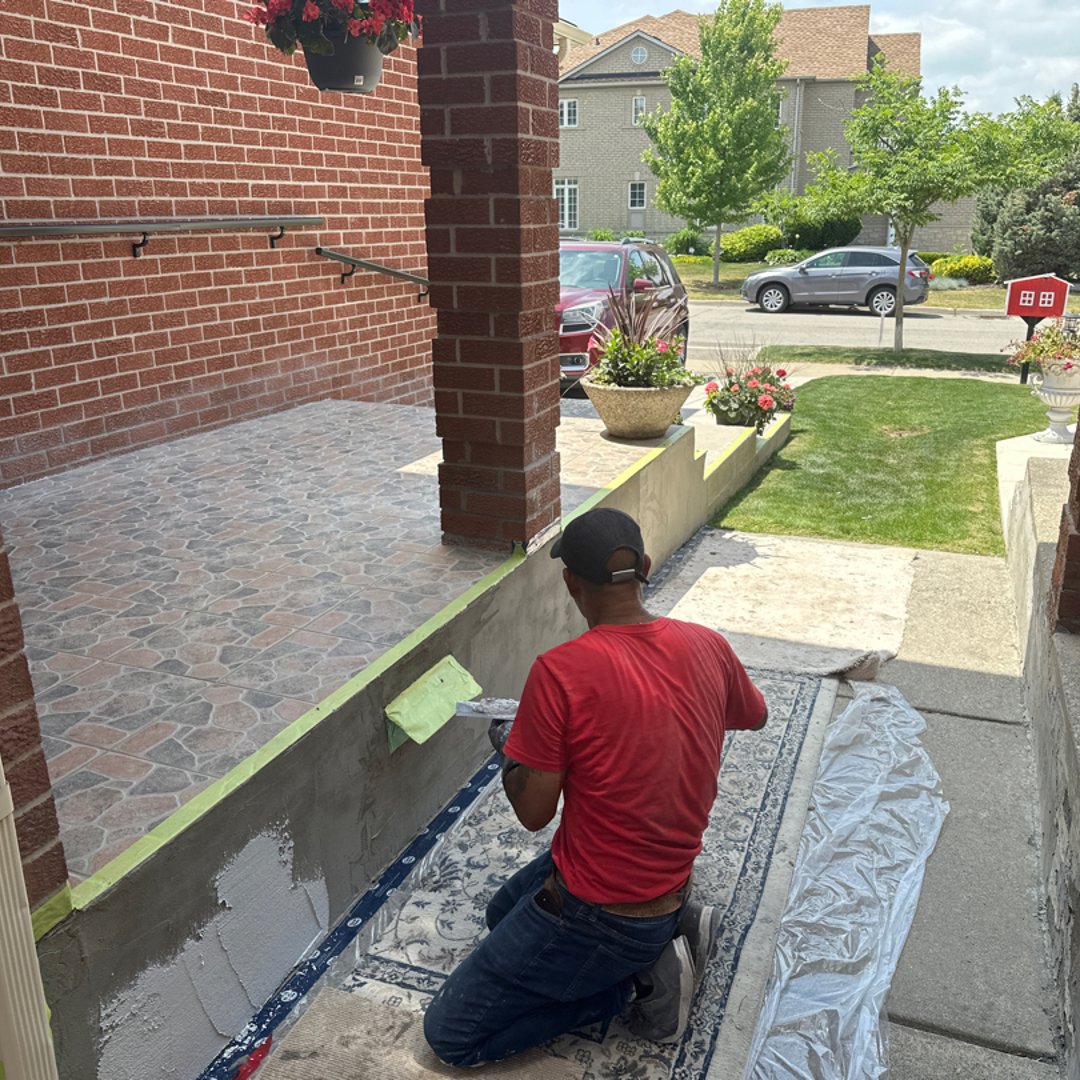
We Assess the Problem
We inspect the damage, identify what caused it, and plan the fix. No shortcuts—just a clear path to doing it right.


Brick damage doesn't fix itself. Spot these warning signs early to avoid expensive repairs later.
Faces flaking or popping off indicate trapped moisture froze and expanded. Ontario freeze-thaw cycles spread this to adjacent units—water infiltration must be stopped through repointing or replacement.
Cracks wider than 1/4 inch that follow mortar joints or run horizontally signal foundation movement or structural stress. Left unaddressed, these widen and compromise load-bearing capacity.
Recessed or powdery mortar joints let water penetrate the wall, causing interior damp spots and efflorescence. This accelerates freeze-thaw damage and weakens surrounding masonry units.
Seeing any of these? Get a free assessment.
Masonry repair covers brick, natural stone, manufactured stone, and concrete block. Work ranges from repointing a few joints to replacing damaged units to structural reinforcement.
Good repair starts with diagnosis. Why did this fail? Water? Settlement? Poor original construction? We identify the cause, fix it properly, and use materials compatible with your existing masonry.
Visible damage
Cracks, spalling, missing mortar, loose units—address before it spreads.
Water problems
Leaks, damp spots, or efflorescence indicate failed masonry somewhere.
Before selling
Masonry damage shows up in inspections. Repair before listing.
Different brick problems call for different repairs. We look at the damage and recommend the lightest fix that actually solves it—nothing more, nothing less.
Replace damaged bricks, match colour and texture, and repoint surrounding joints. Repairs blend invisibly with original work.
Repair cracked or spalled natural stone, reset loose stones, and repoint with appropriate mortar. Heritage buildings use lime-based mixes.
Fix cracked or damaged concrete block, reinforce weak sections, and seal against water. Common in foundations and retaining walls.
Remove failed mortar and replace with properly matched new mortar. Protects masonry units and restores appearance.
Not sure which service you need?
Why it matters to fix it right
Water damage spreads. A small crack becomes spalling, then loose bricks, then structural issues. Early repair limits scope.
Proper repairs match existing materials. Your wall looks original, not patched.
Masonry walls are load-bearing. Deterioration compromises structure over time.
Damaged masonry is a red flag for buyers and inspectors. Good condition protects resale.
Planned maintenance costs less than emergency work. Address problems on your schedule.
Our Process
Transparent process, quality results. Here's what to expect.

We inspect the damage, identify what caused it, and plan the fix. No shortcuts—just a clear path to doing it right.

Clean prep, proper materials, careful execution. We're detail-oriented because the small stuff determines how long the work lasts.

Repairs that blend in, a site you'd never know we touched, and a warranty you can count on.
Clear documentation of what's included in every project
We let you know when we're coming, what we're doing, and when we're done
We review the finished work together before sign-off
Ready to get started? Book a free on-site estimate.
Schedule EstimateBrick and mortar matching so seamless, you can't tell where we worked.
Same trained team on every job. No middlemen, no surprises.
Drop cloths, dust control, daily cleanup. Your yard stays as clean as we found it.
Something not right? We come back and fix it. In writing.
4.9★ average. See what your neighbours say.
We assess on site and provide detailed quotes—here are the main factors
Repointing a few joints differs from replacing brick or addressing structural cracks. We assess and scope accurately.
Standard brick is readily available. Heritage brick, natural stone, or specialty materials require sourcing.
Ground-level work is straightforward. Multi-story or hard-to-reach areas require scaffolding or lifts.
If water infiltration or settlement caused the damage, addressing the cause adds to scope.
Close colour and texture matching takes time. Exact matching of discontinued materials takes more.
We provide itemised quotes so you know exactly what you are paying for. No hidden fees.
Your Quote Includes
Free on-site quote · No obligation
800+ reviews
Had cracks running through the brick and was worried it was structural. They assessed it, explained what was happening, and fixed it properly. The repair is invisible.
Kevin M.
Our stone foundation was crumbling in spots. They matched the stone, used the right mortar, and it looks like it has been there for 100 years. Which it has.
Susan P.
The mortar between our bricks was falling out. They repointed the whole wall and it looks better than when we bought the house. Clean work, fair price.
Daniel R.
Everything you need to know before getting started.
Explore related services, locations, and helpful guides from our masonry experts.
4 services
5 locations
We repair brick, stone, and block throughout Southern Ontario. Residential and commercial, from minor repairs to major restoration.
14 cities
8 cities
6 cities
10 cities
11 cities
12 cities
17 cities
Don't see your city? Contact us—we likely service your area. Contact us to check if we cover your area.
Ready to Get Started?
Book your estimate online in minutes. Pick a time, upload project photos, and you're confirmed instantly. No phone tag required.